In recent times, there has been an alarming rise in claims from a company known as Copytrack regarding image copyright violations.
While some image licensing companies do legitimate work, it appears that many users have reported suspicious and fraudulent behavior from Copytrack, particularly in regard to false image claims.
Understanding how to deal with these claims is crucial for website owners, bloggers, and content creators. In this blog, we will explore how to identify a Copytrack scam and provide practical steps on how to handle such claims.
What Is the Copytrack Scam All About?

Copytrack claims to specialize in tracking down unauthorized use of images and collecting payments on behalf of photographers and rights holders.
However, there have been increasing reports that Copytrack is engaging in questionable activities, such as making baseless image claims. Many recipients of these claims have discovered that the images in question were legally obtained or free-to-use content, often from platforms like Canva.
For example, an individual recently reported receiving three to four claims in a single month from Copytrack. These claims targeted images that were downloaded from Canva, a well-known platform for providing legally licensed images.
When asked to provide documentation proving the claims, Copytrack failed to offer any substantial evidence. This raises red flags about their legitimacy.
How to Spot a Copytrack Scam Claim?
Dealing with Copytrack image claims requires caution. Here are a few ways to spot whether the claim is legitimate or part of a scam:
- Check the Source of Your Images: If you are sure that the images were obtained from legal sources, such as Canva or other royalty-free image platforms, the claim is likely fraudulent.
- Ask for Proof of Copyright Ownership: Request the documentation of ownership from Copytrack. If they cannot provide clear information about the rights holder or show proper licensing details, this is a red flag.
- Review Their Online Reputation: A quick web search or visit to their Google My Business Profile shows that Copytrack has been flagged as scammers by numerous users. For instance, reviews like those found here clearly reveal their questionable practices.
- Investigate Their Communication: Scammers often use vague language and provide little to no legitimate evidence in their communications. Ensure that the emails you receive contain the official company details, including contact information and physical addresses.
| Legitimate Image Claim | Copytrack Scam Claim |
| Provides documentation of copyright | Fails to provide clear proof of ownership |
| Lists details of the client they represent | Uses vague or no information about rights holders |
| Claim aligns with images not licensed | Targets images legally obtained from platforms like Canva |
Users’ Reviews About Copytrack on Google My Business Confirm They Are a Scam Company
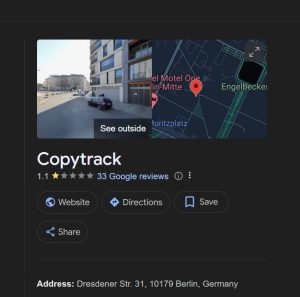
One of the easiest ways to determine whether a company is legitimate is by checking customer reviews. Copytrack’s Google My Business profile reveals a series of negative reviews, with numerous individuals calling the company a scam.
Many have shared their experiences of receiving false claims for images that were either royalty-free or sourced legally.
Reviews often mention that Copytrack fails to provide clear documentation, refuses to name the rights holders, and continuously sends follow-up emails in an attempt to intimidate users into paying fines.
The overwhelming feedback from users indicates that Copytrack operates in a suspicious manner, which strongly suggests they are not a legitimate company.
Is Copytrack Legit?
No, Copytrack is not legit. The overwhelming evidence from user reviews and reports of fraudulent image claims indicate that Copytrack operates more like a scam than a legitimate image tracking service.
Users have found their claims to be baseless and lacking any credible evidence of copyright infringement. Their refusal to provide proof of ownership further confirms their lack of legitimacy.
How to Deal with Copytrack Emails?
Receiving an email from Copytrack can be stressful, but here’s how to handle it:
- Don’t Panic: Scammers thrive on fear. Take time to carefully read through the claim and identify any red flags.
- Verify the Image Source: Double-check where you obtained the image in question. If it was from a legal platform like Canva or Unsplash, the claim is likely fraudulent.
- Request Proof: Reply to the email asking for proof of copyright ownership and the details of the company they claim to represent. In most cases, they will not be able to provide this information.
- Ignore If It’s Clearly a Scam: If you are confident the claim is fake, you can safely ignore the email. Most scammers will not pursue legal action if they know their claims are illegitimate.
- Consult a Lawyer: If you’re uncertain or feel pressured, consult with a legal expert. They can review the situation and help you respond appropriately.
Is Copytrack a Scam?
Yes, Copytrack is a scam, as proven by numerous user reviews and reports. Many individuals have received baseless claims from Copytrack for images they legally obtained, often from reputable platforms like Canva or Unsplash.
Their refusal to provide clear evidence of ownership and their shady practices further solidify their reputation as scammers. Their Google My Business reviews are filled with similar complaints, highlighting their fraudulent activities.
How to Deal With Such Fake Image Claims Legally in the UK?
If you are based in the UK and receive fake image claims from companies like Copytrack, there are a few legal steps you can take to protect yourself:
- Keep All Correspondence: Save all emails and communication related to the claim. This documentation could be crucial if the case escalates to legal proceedings.
- Request Legal Documentation: Ask the claimant to provide legal proof of their claims, such as the copyright certificate or licensing agreements.
- Consult a Lawyer: If the claim persists, consult a solicitor who specializes in intellectual property law. They will help you navigate the situation and may advise you to report the claim to the relevant authorities.
- Report the Claim: If you are certain the claim is a scam, report it to UK authorities such as Action Fraud or the Information Commissioner’s Office (ICO).
- Send a Cease and Desist: In some cases, a lawyer may advise sending a cease-and-desist letter to stop further communications from the scam company.
Why Business Owners Should Be Aware of Such Scam Image Claims?
Business owners, particularly those in the digital space, need to be vigilant about scam image claims. Scammers often target blogs, websites, and eCommerce businesses with baseless claims in an attempt to extract settlement payments. Falling for such scams can result in financial loss, wasted time, and damage to your business’s reputation.
- Financial Impact: Many businesses, particularly small ones, may panic and pay settlements just to avoid potential legal issues. This results in unnecessary expenses.
- Time Consumption: Dealing with multiple claims can be time-consuming, taking attention away from your core business activities.
- Reputation Risk: Businesses that respond to these claims without proper investigation may face reputational risks, especially if they are accused of copyright infringement without cause.
By staying aware of these scams, businesses can safeguard themselves from potential harm and continue to use legally sourced content without fear of fraudulent claims.
What Users Say About Copytrack (Google My Business Reviews)?
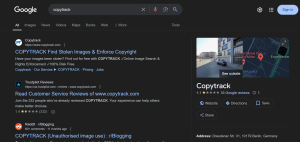
The reviews on Copytrack’s Google My Business profile reveal a highly negative perception of the company. Many users express frustration over receiving baseless image claims, with some calling the company a “scam.”
Several users report that Copytrack fails to provide sufficient proof of copyright ownership when asked, and their claims often target images that are royalty-free or legally obtained from platforms like Canva.
One common theme across many reviews is the lack of transparency. For instance, users have highlighted that Copytrack’s demands often come without clear documentation or legal verification, leaving people feeling uncertain and suspicious.
Additionally, the company tends to use intimidation tactics by sending threatening emails to compel payments. These aggressive approaches are seen as a major red flag, leading many to warn others about their experience.
For example, some reviewers have shared that after challenging Copytrack’s claims by asking for proof of ownership or licensing documentation, the company failed to provide any concrete information.
In fact, many users mentioned that when they pushed back on the claims, the cases were quickly closed without explanation, further reinforcing the idea that these claims may be part of a larger scam operation.
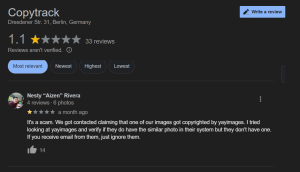
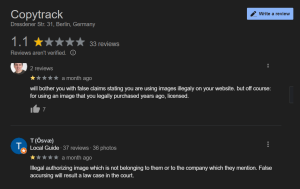
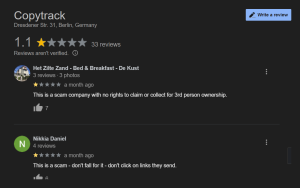
Several users who checked Copytrack’s Google reviews also noted that the overwhelming number of complaints and poor ratings align with their personal experiences of receiving fraudulent claims for images that were not infringing copyright.
These reviews serve as a critical warning for businesses and individuals who might encounter Copytrack’s unsolicited claims.
This feedback on Google My Business confirms that Copytrack’s legitimacy is widely questioned, and many users advise others to stay cautious and thoroughly investigate any claims before taking action
300+ One-Star User Reviews on Trustpilot State Clearly That Copytrack Is a Scam
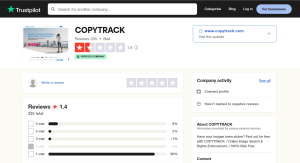
A glance at Copytrack’s Trustpilot profile reveals a troubling pattern of over 300 one-star reviews, with many users openly accusing the company of running a scam.
These reviews frequently cite Copytrack’s intimidating emails and false claims regarding image usage, often demanding large sums of money from individuals and businesses for images that were legally obtained or licensed.
Several reviewers highlight that Copytrack tends to target small businesses and individual website owners, often using fear tactics to extract settlements.
Users also report that Copytrack’s customer service is unresponsive, especially when they ask for proof of ownership for the images in question. This leaves many feeling that they are dealing with a fraudulent operation, rather than a legitimate company.
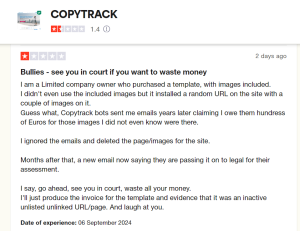
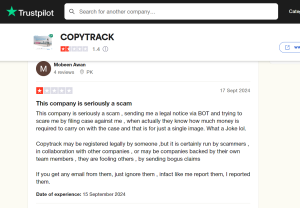
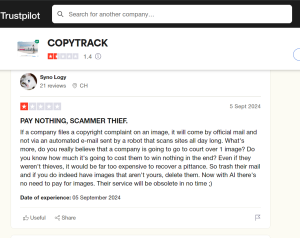
The overwhelming number of negative reviews underscores the fact that Copytrack’s practices are viewed as deceptive, and many customers advise against engaging with the company altogether.
The feedback on Trustpilot aligns with the suspicions raised across other platforms like Google My Business, further reinforcing that Copytrack is not to be trusted.
Conclusion
The rise of scam image claims, particularly from companies like Copytrack, is a growing concern for content creators. Knowing how to identify a Copytrack scam and respond appropriately can save you time, stress, and money.
Always verify the legitimacy of any claim you receive, research the company, and demand proof of ownership before taking any action.
If you’ve received suspicious claims, consider sharing your experience to help raise awareness and protect others from falling victim to these types of scams.
Stay informed, stay cautious, and always defend your rights as a content creator.
Frequently Asked Questions (FAQs)
What makes Copytrack image claims suspicious?
Many Copytrack claims target images that are legally sourced from platforms like Canva. They often fail to provide clear documentation or details about the rights holder, which makes their claims questionable.
Can Copytrack take legal action if I ignore their claim?
If the claim is part of a scam, it is unlikely that Copytrack will pursue legal action. Scammers typically rely on fear tactics rather than taking legitimate legal steps.
How can I protect myself from false image claims in the future?
Always use legally licensed images from reputable sources like Canva or Unsplash. Keep a record of your image licenses in case you need to dispute a claim.
Should I pay a settlement to Copytrack?
Do not pay a settlement until you have thoroughly investigated the claim. If the claim is fraudulent, you should avoid paying altogether.




